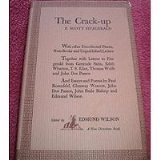
The Crack-Up
Encyclopedia
The Crack-Up is a collection of essay
s by American author F. Scott Fitzgerald
. It consists of previously unpublished letters, notes and also three essays originally written for and published first in the Esquire magazine during 1936. It was compiled and edited by Edmund Wilson
shortly after Fitzgerald's death in 1940.
The main essay starts "Of course all life is a process of breaking down ...." which gives something of the tone of the piece.
It also included positive evaluations of his work by Glenway Wescott
, John Dos Passos
, John Peale Bishop
, et al.
The philosopher Gilles Deleuze
adopted the term crack-up from Fitzgerald to refer to his interpretation of the Freudian death instinct
.
Essay
An essay is a piece of writing which is often written from an author's personal point of view. Essays can consist of a number of elements, including: literary criticism, political manifestos, learned arguments, observations of daily life, recollections, and reflections of the author. The definition...
s by American author F. Scott Fitzgerald
F. Scott Fitzgerald
Francis Scott Key Fitzgerald was an American author of novels and short stories, whose works are the paradigm writings of the Jazz Age, a term he coined himself. He is widely regarded as one of the greatest American writers of the 20th century. Fitzgerald is considered a member of the "Lost...
. It consists of previously unpublished letters, notes and also three essays originally written for and published first in the Esquire magazine during 1936. It was compiled and edited by Edmund Wilson
Edmund Wilson
Edmund Wilson was an American writer and literary and social critic and noted man of letters.-Early life:Wilson was born in Red Bank, New Jersey. His father, Edmund Wilson, Sr., was a lawyer and served as New Jersey Attorney General. Wilson attended The Hill School, a college preparatory...
shortly after Fitzgerald's death in 1940.
The main essay starts "Of course all life is a process of breaking down ...." which gives something of the tone of the piece.
Essays
- "The Crack-Up" (originally Esquire magazine, February 1936)
- "Pasting It Together" (originally Esquire magazine, March 1936)
- "Handle with Care" (originally Esquire magazine, April 1936)
- collected together under the title "The Crackup" in the book
It also included positive evaluations of his work by Glenway Wescott
Glenway Wescott
Glenway Wescott was a major American novelist during the 1920-1940 period and a figure in the American expatriate literary community in Paris during the 1920s. Wescott was gay. His relationship with longtime companion Monroe Wheeler lasted from 1919 until Wescott's death.-Biography:Wescott was...
, John Dos Passos
John Dos Passos
John Roderigo Dos Passos was an American novelist and artist.-Early life:Born in Chicago, Illinois, Dos Passos was the illegitimate son of John Randolph Dos Passos , a distinguished lawyer of Madeiran Portuguese descent, and Lucy Addison Sprigg Madison of Petersburg, Virginia. The elder Dos Passos...
, John Peale Bishop
John Peale Bishop
John Peale Bishop was an American poet and man of letters.Bishop was born in Charles Town, West Virginia, to a family from New England, and attended school in Hagerstown, Maryland. When 18, Bishop fell victim to a severe illness and lost his sight for some time...
, et al.
Reaction
The essays when originally written were poorly received and many were openly critical, particularly of the personal revelations. However time has been somewhat kinder to them and the collection is an insight into the mind of the writer during this low period in his life.- "The essays stand today as a compelling psychological portrait and an illustration of an important Fitzgerald theme"
The philosopher Gilles Deleuze
Gilles Deleuze
Gilles Deleuze , was a French philosopher who, from the early 1960s until his death, wrote influentially on philosophy, literature, film, and fine art. His most popular works were the two volumes of Capitalism and Schizophrenia: Anti-Oedipus and A Thousand Plateaus , both co-written with Félix...
adopted the term crack-up from Fitzgerald to refer to his interpretation of the Freudian death instinct
Death instinct
In classical Freudian psychoanalytic theory, the death drive is the drive towards death, self-destruction and the return to the inorganic: 'the hypothesis of a death instinct, the task of which is to lead organic life back into the inanimate state'...
.
External links
- The Crack-Up By F. Scott Fitzgerald, EsquireEsquire (magazine)Esquire is a men's magazine, published in the U.S. by the Hearst Corporation. Founded in 1932, it flourished during the Great Depression under the guidance of founder and editor Arnold Gingrich.-History:...
. Originally published in Esquire's February, March, and April 1936 issues.

